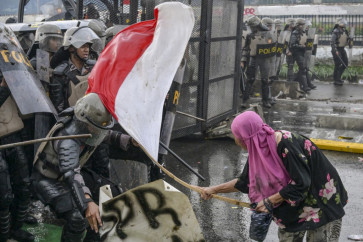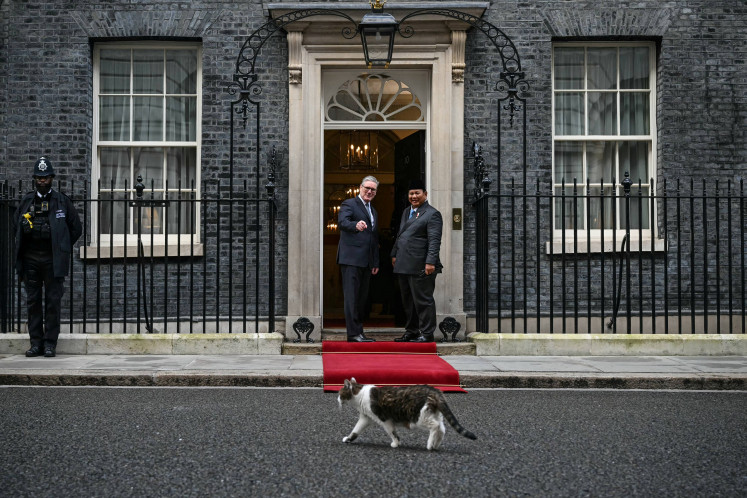Popular Reads
Top Results
Can't find what you're looking for?
View all search resultsPopular Reads
Top Results
Can't find what you're looking for?
View all search resultsDeath penalty: Justified murder
It is actually very easy to canalize masses to an idea
Change text size
Gift Premium Articles
to Anyone
I
t is actually very easy to canalize masses to an idea. And if the so-called idea is monopolized by the state, the propaganda materials are at hand and education is one-sided, and in a short amount of time the majority of the country would become influenced by ideas they would not normally have and do things they would not normally do.
The root cause of this is the lack of an ideology. Masses with no cause, purpose and aim are more easily influenced by one-sided education provided. In Russia or on the streets of Germany a large portion of the people cheering for street executions could ask the question, 'what did we do?' only after they woke up from that nightmare.
What about the ones who are currently living the same nightmare, are they aware of their position?
The hashtag I started to oppose the execution of Abdul Quader Mollah recently became a trending topic in a couple of hours throughout the world.
Through the effect of social pressure, the decision of execution given without trial or defense was postponed to a new court hearing to be held on the following day.
During this initiative, there were many who reached out from Bangladesh to express their gratitude. However there were some young people in their 20's saying, 'Don't try to stop us. We will execute Mollah.'
Such a young person but so eager to kill a human being. How did he take this brutal decision? How was he so sure that the culprit of a crime committed long before he was born was finally found?
Even if they had found the culprit, how did he come up with the tenacity and determination to slaughter him?
This is the result of societies, with no ideal and afar from faith and fear of God, who are convinced that there is a cruel system in the world and that violence and brutality are inevitable. They get used to death and to killing, just as they get used to believe that life is of no value and purpose and they have to do everything through violence and anger.
Such societies are generally third world countries where people are killed on the streets and mass executions are ruled and carried out silently with no plea at all. With the influence of their dark mentality, they consider death penalty as a requirement of society or the law. They don't even realize that this is actually murder.
However, execution is one of the greatest ferocities that societies could ever face. It is not a punishment that allows the culprit to repent, to amend his ways or to learn from the past; once a person is dead, there is no way he can learn from the past, repent or amend his ways. If the aim is the security of society, the same or better outcomes can be achieved with life imprisonment or through rehabilitation.
But execution is another name for murder.
Societies attempted to be disciplined through executions get more used to violence. They believe that they can solve all their problems by killing. The brutality that comes with it turns into governments that always accept the death penalty as a solution. Today when we look at the countries where the death penalty is official we can have a better understanding of the situation.
Words like law, court and verdict cannot soften the idea of murder. The fact that the decision is made by official authorities, approved by governments and no one is saying anything doesn't make this barbarity something other than murder. Muslims must avoid this brutal system, which is dominant especially in Muslim communities, because Islam assertively prohibits killing.
Those who try to find evidence to a brutality like execution from the Koran are gravely mistaken. In the verse about retaliation in the Koran, God reveals 'forgiveness' as a greater mercy (Koran, 2: 178). God commands forgiveness and mercy against evil.
God doesn't like oppressors. Islamic communities must show mercy in the face of evil, educate oppressors and provide solidarity and unity in order to become oppressor-free exemplary societies. What befits a Muslim is to choose mercy and educate the opposing party in the best possible way with the Koran.
Death sentences brutally and quietly carried out through unlawful court verdicts are now a big disgrace on the part of Islamic countries in the world. As the moral values God praises are not followed, societies become communities of anger rather than love. Executions fan the flames of anger and so do anger of executions. And the ideal-less young people of that society cheer for such a massacre, as they are raised with hatred and are under the influence of propagandas.
If we want our youth, not cheering for murder but with ideals, full of love and hope, then we must communicate the Koran message of 'forgiveness' and 'mercy' to them. We must raise faithful societies, not hateful ones. We must teach them not how to kill someone but how a flower coming out of soil rises to the sky ' so they can get to know their Creator.
If they see the miracles, know God as their Creator and learn love they cannot easily commit any crimes. They will not easily cheer for murder.
The writer has published more than 300 books on various topics related to Islam.










